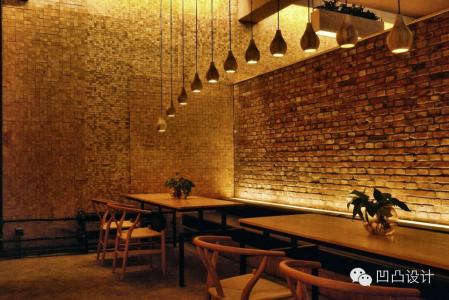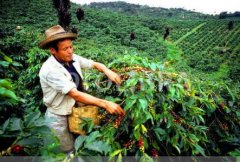A brief introduction to the treatment method of grinding degree and baking degree of Rwanda boutique coffee beans with sweet fruit

With the good natural conditions of high altitude and fertile volcanic soil, the country's fertile soil and suitable climate contribute to plant growth, and coffee trees seem to be driven or forced to grow upward, or because they grow too fast to produce the best coffee beans. The beautiful country of thousands of hills Rwanda has a long and rich culture for growing highland coffee, mainly high-quality Arabica coffee. Rwanda is the only country in the world that can fully enjoy the harmony between soil, altitude and climate. In this unique growing environment, high-quality coffee from Rwanda has a distinctive taste and aroma.
Bourbon coffee grown in Rwanda is one of the original varieties of Arabica coffee. In the annual professional evaluation of the top coffee held by SCAA of the American Fine Coffee Association in 2008, Rwanda Aromec of Rwanda beat the blue mountain No.1 of Jamaica and Mantenin G1 selection of Sumatra, and won the 2008 champion COE (Cup of Excellence) prize. You can see the quality of Rwanda's washed bourbon coffee.
Rwanda plans to export 3000 tons of coffee this year, further increasing coffee production to meet the growing market demand. Starbucks, the world's largest coffee and beverage retailer, has also partnered with the Rwandan government to import Rwanda coffee, just as a brown pigeon flies from the coffee cup against the line of "Cup of Hope" on the trademark of Rwandan coffee.
Coffee places the hopes of the people of Rwanda. They hope to increase coffee exports to promote the country's economic development, and they also hope that the two major tribes, the Hutu and the Tutsi, who once killed each other, will work together to grow coffee, eliminate gratitude and hatred, and jointly build a better tomorrow. After a careful taste of Rwanda bourbon, I think it tastes really good. It is worth recommending that the taste of Rwandan coffee is described as "grass aroma" with tropical climate characteristics. In addition to the sweet fruit taste of this coffee, it also gives people a feeling of freshness, clarity, and freshness. Bourbon coffee grown in Rwanda is amazing for its sweet fruit, full-bodied, unrestrained and lingering aftertaste. This coffee has a delicious, citrus sweetness and a deep chocolate color. With red apples, cherries, cinnamon and honey, high-quality sweetness and balance, cinnamon, almonds and chocolate, Rwanda coffee is mainly produced by small farmers like many African countries.
Rwanda has been growing coffee since colonial times. Although the crops are mainly coffee, the quality of coffee produced in Rwanda is not outstanding, and its status in the coffee world is low, and few people pay attention to it. Most of the coffee varieties grown in Rwanda are bourbon. Rwanda, known as the "country of a thousand hills", has a high-altitude mountain environment, fertile volcanic soil and abundant precipitation, and has a climate conducive to the growth of coffee trees. The advantages of varieties and excellent natural conditions should have produced high-quality coffee, but why the quality of its coffee performance is not satisfactory? The reason lies in the later stage of processing. Improper handling will reduce the quality of coffee and sacrifice a lot of good flavor in vain. Harvesting, planting, treatment, grading, transportation and other links will directly affect the quality of raw coffee beans, in which the lack of control in a certain link will become a stumbling block to good coffee.
The coffee fruit needs to be transported to the processing plant as soon as possible after picking, but due to the lack of domestic facilities, it is unable to deal with the fruit at the first time. The fruits are piled up after being picked, which will continue to develop and accelerate mildew and decay due to lack of ventilation. Rotten fruits will affect the quality of coffee and show defective flavor.
[product name]: Rwanda bourbon boutique coffee (Rwanda Bourbon Specialty)
[quality rating]: AA
[baking degree]: recommended baking degree city or deep city baking (City Roast or Full City Roast)
[grade]: good
[particles]: ★★ plump
[acidity]: ★★★ micro acid
[equilibrium]: ★★★ stable
[flavor]: soft, strong fragrance, with sweet fruit and wild grass aroma.
[coffee producing areas]: Butale area, southwestern Rwanda (Rwanda Butare)
[planting altitude]: 1200-1800 m
[raw bean variety]: bourbon original (Bourbon Variety)
[raw bean treatment]: washing and refining method
[special]: since the 1920s, Arabica coffee grown in Rwanda has been famous for its unique fruit sweetness and rich grass aroma. In recent years, the Rwandan government has taken positive measures to vigorously promote coffee production, set up coffee production cooperatives in various places, and give technical guidance and financial support to farmers, so that coffee production has made considerable progress.
Rwanda is known as the "country of a thousand hills". It is full of mountains and plateaus, and most areas are tropical plateau climate and savanna climate, which is mild and cool. There are about 33000 hectares of coffee plantations and 500000 people are engaged in the coffee industry.
Important Notice :
前街咖啡 FrontStreet Coffee has moved to new addredd:
FrontStreet Coffee Address: 315,Donghua East Road,GuangZhou
Tel:020 38364473
- Prev

Cultivation of sweet citrus coffee beans in Rwanda A brief introduction to the geographical location, climate and altitude
In June 2002, representatives of public coffee visited Malaba. At that time, the current President of Rwanda, Paul Kagame, declared the importance of the plan on behalf of the government. Public Coffee bought 18000 kilograms (40000 pounds) of Malaba beans at $3 per kilogram above the average market price. Coffee beans are transported to Louisiana, where they are roasted and used in
- Next

A brief introduction to the description of the flavor and aroma characteristics of Colombian boutique coffee beans with smooth taste
Colombian coffee is often described as silky and smooth. Of all the coffees, it is the most balanced, soft, smooth and ready to drink, and it has won praise that no other coffee can: green gold. Colombian coffee is a representative and excellent variety of Arabica coffee, and it is also a traditional deep roasting.
Related
- Detailed explanation of Jadeite planting Land in Panamanian Jadeite Manor introduction to the grading system of Jadeite competitive bidding, Red bid, Green bid and Rose Summer
- Story of Coffee planting in Brenka region of Costa Rica Stonehenge Manor anaerobic heavy honey treatment of flavor mouth
- What's on the barrel of Blue Mountain Coffee beans?
- Can American coffee also pull flowers? How to use hot American style to pull out a good-looking pattern?
- Can you make a cold extract with coffee beans? What is the right proportion for cold-extracted coffee formula?
- Indonesian PWN Gold Mandrine Coffee Origin Features Flavor How to Chong? Mandolin coffee is American.
- A brief introduction to the flavor characteristics of Brazilian yellow bourbon coffee beans
- What is the effect of different water quality on the flavor of cold-extracted coffee? What kind of water is best for brewing coffee?
- Why do you think of Rose Summer whenever you mention Panamanian coffee?
- Introduction to the characteristics of authentic blue mountain coffee bean producing areas? What is the CIB Coffee Authority in Jamaica?

